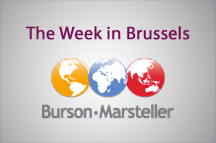 European Union officials in Brussels would like the first week of October to be remembered as the moment they took steps to plug the gaps in the bloc’s corporate tax system, as tech giants Amazon and Apple were called to order over unpaid bills. But as usual, other issues got in the way. The EU found itself reluctantly dragged into the crossfire of the Catalan crisis. And with Britain still defining its Brexit strategy, there was a grim warning about the lack of progress in the negotiations.
European Union officials in Brussels would like the first week of October to be remembered as the moment they took steps to plug the gaps in the bloc’s corporate tax system, as tech giants Amazon and Apple were called to order over unpaid bills. But as usual, other issues got in the way. The EU found itself reluctantly dragged into the crossfire of the Catalan crisis. And with Britain still defining its Brexit strategy, there was a grim warning about the lack of progress in the negotiations.
Tech tax attack
EU Competition Commissioner Margrethe Vestager has been a regular figure in the Brussels press room, flashing both steel and charm as she takes on big businesses that try to bend the rules.
Firstly, she ordered Amazon to repay some €250 million in back taxes to Luxembourg, saying that the internet shopping titan had benefited from an illegal tax deal with the tiny principality. She then announced plans to take Ireland to the European Court of Justice for failing to collect billions from Apple. This came more than a year after Vestager had ordered Apple to repay €13 billion in back-taxes to Ireland over a sweetheart deal that she had also ruled as illegal.
The double tech attack follows her plans to up a special tax targeting Google and Facebook. She is echoed by French President Emmanuel Macron, who last month called for a new type of tax on tech behemoths based on how much value they create in a country rather than the profits.
 Catalan crisis
Catalan crisis
The tax crusade reflects what the Commission likes to do best: regulation. But politics intruded with Catalonia’s controversial independence referendum. The Commission had attempted to stay out of the escalating crisis, initially insisting that this was an internal Spanish matter – a position maintained in other EU capitals. But Vice President Frans Timmermans finally spoke out during a European Parliament debate on the issue on October 4, saying the Spanish government’s “proportionate use of force” was necessary to uphold the rule of law.
To say that this is a sensitive issue is an understatement. Separatist movements are bubbling across Europe, from Scotland to Flanders. The Commission already took a position ahead of the 2014 Scottish referendum, warning that an independent Scotland would have to reapply for EU membership. There are, of course, EU implications for separatist movements, yet the Commission could be forgiven for being cautious: this is exactly the sort of issue that risks being seen as unwelcomed EU interference.
Brexit
Brexit is a different kind of separatism, where the EU27 has much more at stake. But six months after Article 50 was triggered, kicking off the two-year divorce talks, the negotiations have made scarce progress. Commission President Jean-Claude Juncker spoke out on October 3, telling MEPs that there had not yet been “sufficient progress” in the talks. His warning fed into a Parliament resolution voted the following day, that the Brexit talks should not be allowed to progress to the next stage, discussing a future trade deal between the UK and the EU27, unless there is a "major breakthrough".
Here, at least, the EU27 are united and clear: they have a common position, and a clear objective. But as always, there is the risk of politics intruding in some way. As the EU has found in recent years, its best-laid plans can often go awry.














